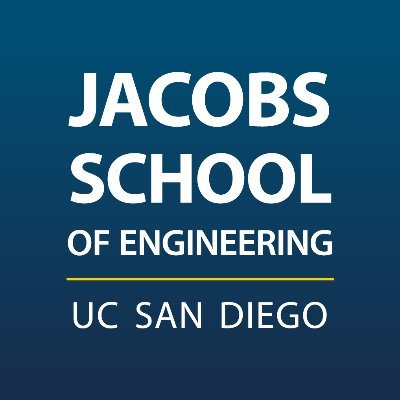News

October 29, 2015
UC San Diego Launches Robotics Institute
The Jacobs School of Engineering and Division of Social Sciences at UC San Diego have launched the Contextual Robotics Institute to develop safe and useful robotics systems. These robotics systems will function in the real world based on the contextual information they perceive, in real time. Elder care and assisted living, disaster response, medicine, transportation and environmental sensing are just some of the helpful applications that will emerge from tomorrow’s human-friendly robots.The Contextual Robotics Institute will leverage UC San Diego’s research strengths in engineering, computer science and cognitive science and work collaboratively across the campus and the region to establish San Diego as a leader in the research, development and production of human-friendly robotics systems. Full Story

October 27, 2015
Bioengineers cut in half time needed to make high-tech flexible sensors
Bioengineers at UC San Diego have developed a method that cuts down by half the time needed to make high-tech flexible sensors for medical applications. The advance brings the sensors, which can be used to monitor vital signs and brain activity, one step closer to mass-market manufacturing. The new fabrication process will allow bioengineers to broaden the reach of their research to more clinical settings. It also makes it possible to manufacture the sensors with a process similar to the printing press, said Todd Coleman, the bioengineering professor at the Jacobs School leading the project. Full Story

October 15, 2015
Researchers identify a new culprit behind fibrosis
An international team of researchers has identified a new molecule involved in skin fibrosis, a life-threatening disease characterized by the inflammation and hardening of skin tissue. The new study is the first to investigate the role of this molecule in skin fibrosis and paves the way toward new and improved therapies for the disease. Full Story

October 14, 2015
Meet the Jacobs School's 17 new faculty
The Jacobs School of Engineering at UC San Diego is building and strengthening its research abilities by hiring 17 new faculty this year. With these hires, the school is increasing its impact in clinical medicine, robotics, wireless technologies, genomics, data sciences and cybersecurity, clean energy, advanced manufacturing—and more. Full Story

October 13, 2015
2016 Siebel Scholars Announced
Five engineering graduate students from the University of California, San Diego from across the Departments of Bioengineering and NanoEngineering have been named 2016 Siebel Scholars. The Siebel Scholars program recognizes exceptional students at the world’s leading graduate schools of business, computer science, and bioengineering and provides them with a financial award for their final year of studies. With the Class of 2016, the Siebel Scholars program has expanded to engage outstanding leaders in the field of energy science. Full Story

October 6, 2015
NIH Common Fund selects UC San Diego engineers as High-Risk, High-Reward Research Awardees
Two engineering professors from the University of California, San Diego have received $5.9 million in combined funding from the National Institutes of Health (NIH) High-Risk, High-Reward Research program supported by the NIH Common Fund. The two professors, Sheng Zhong in the Department of Bioengineering and Darren Lipomi in the Department of Nanoengineering, are among five professors from UC San Diego to receive an award from the program in 2015. Full Story

October 5, 2015
NIH Establishes 4D Nucleome Research Centers and Organizational Hub at UC San Diego
Under its new 4D Nucleome Program, the National Institutes of Health (NIH) Common Fund has awarded three grants totaling more than $30 million over five years to multidisciplinary teams of researchers at University of California, San Diego. Full Story

October 1, 2015
Robots in the Operating Room
University of California, San Diego bioengineering alumnus Jonathan Sorger, Director of Medical Research at Intuitive Surgical in Sunnyvale, California, is one of the ten keynote speakers at the UC San Diego Contextual Robotics Forum on Oct. 30, 2015. Sorger will offer a vision of the future of medical robotics, including how technologies will continue to augment the surgical experience. Full Story

September 24, 2015
UC San Diego Engineers on Thomson Reuters list of Highly Cited Researchers
Three professors from the University of California, San Diego Jacobs School of Engineering have earned a spot on the Thomson Reuters list of Highly Cited Researchers in 2015 for exceptional impact in their fields. The three professors, Yuri Bazilevs, Bernhard Palsson and Joseph Wang are among 22 professors and researchers from UC San Diego named to the prestigious Highly Cited Researchers list. Full Story

September 16, 2015
Hearts build new muscle with this simple protein patch
An international team of researchers has identified a protein that helps heart muscle cells regenerate after a heart attack. Researchers also showed that a patch loaded with the protein and placed inside the heart improved cardiac function and survival rates after a heart attack in mice and pigs. Animal hearts regained close to normal function within four to eight weeks after treatment with the protein patch. It might be possible to test the patch in human clinical trials as early as 2017. Full Story
